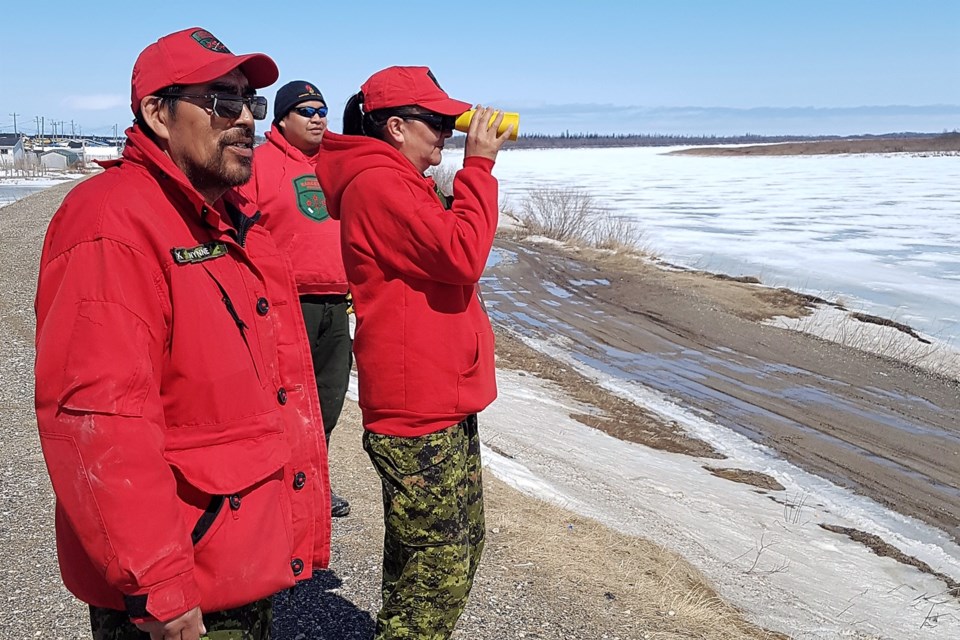The James Bay First Nation of Kashechewan says aid from the federal government has fallen short as it confronts a massive COVID-19 outbreak.
There were 198 active cases in the community of around 1,800 as of Saturday, the Weeneebayko Health Authority reported, with 65 of those newly confirmed that day.
Of those, 125 cases involved youth 17 and under, with most adults in the First Nation vaccinated. Children as young as four months old had been infected, Kashechewan’s chief and council said in a statement.
As of Friday, eight community members had been airlifted to hospitals in southern Ontario for treatment. A number of the cases have screened positive for alpha or B.1.1.7 variant first discovered in the U.K.
Chief Leo Friday has laid a large part of the blame for the situation at the federal government’s doorstep, both for years of inaction on improving its housing situation, and for what the community has called an inadequate response to the current crisis.
Minister of Indigenous Services Marc Miller pushed back on those critiques with a statement Sunday, saying the federal government was providing a wide range of supports to the beleaguered First Nation, though not necessarily meeting specific community requests.
Chief Friday has said the outbreak is straining the band’s ability to respond.
“Community leaders and workers who are not in isolation are quickly becoming exhausted and burnt out,” he said in a statement.
The community entered a 24-hour curfew Saturday night as the crisis deepened, which is set to remain in place at least until June 26.
Friday expressed frustration with the federal government for not moving forward more quickly with relocating the community away from a flood plain, where it was forcibly relocated in 1957.
“It didn’t have to be this way,” he said in a statement Friday. “For years we have been asking for help to address our housing and infrastructure needs… We are told time and again by the government to submit proposals for support, but the proposals have been rejected or delayed.”
Many of the more than 121 members identified as high-risk contacts are functionally unable to self-isolate, he said.
“We have some three-bedroom homes with 18 people living in them and others with four family groups.”
The community has erected tents on the grounds of its high school to support isolation, but those staying there were still left with shared washroom and kitchen facilities.
Requests for support over the past week had not been heeded, Friday said, suggesting a Thursday call with Miller ended without concrete commitments to help.
“The council has requested Canadian military support to erect a field hospital, bring in needed supplies, and build isolation shelters in the community, but so far, the government ministers in Ottawa and Toronto who need to approve that support have not agreed.”
In a statement Sunday, Miller said the federal government would work with partners to supply temporary isolation structures, but did not commit to military support to erect a field hospital.
The Canadian Armed Forces had mobilized 15 Canadian Rangers to Kashechewan, he stated, while members of the CAF would be on hand in the First Nation Sunday to “perform further in-person assessment of immediate needs.”
Meanwhile, he said the government had deployed an additional six nurses to the community, for a total of fifteen on the ground. There are also three Indigenous Services Canada paramedics and two physicians, he said.
A request from the community for an additional $453,000 in funding would also be met through the Indigenous Community Support Fund and Public Health Measures Fund, Miller said, stating that would bring Kashechewan’s total COVID-19 response funding to $8 million.
The funds will support food supplies and transport, personal protective equipment, a pandemic response coordinator, quarantine officers, COVID-19 screeners and testing personnel, security, and communications, according to the ISC statement.
"The health and safety of Kashechewan residents remains our top priority,” Miller stated. “Our government is working closely with the leadership of Kashechewan First Nation and other partners… to address the urgent health needs of the community in light of a recent COVID-19 outbreak.”
Timmins-James Bay MP Charlie Angus criticized Miller’s failure to respond to the crisis more quickly.
“The community begged Ministers Marc Miller and Bill Blair for help all week,” he said on social media. “Government said they were ‘assessing the situation’ as numbers doubled and then doubled again.”
Other James Bay communities are facing smaller outbreaks of their own, with 35 cases in Fort Albany, 24 in Moosonee, 10 in Attawapiskat, and 6 in Moose Factory.
